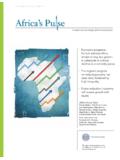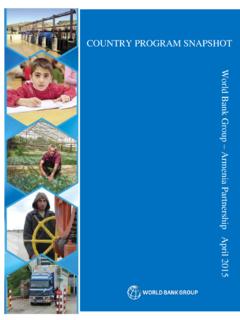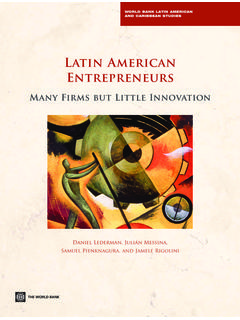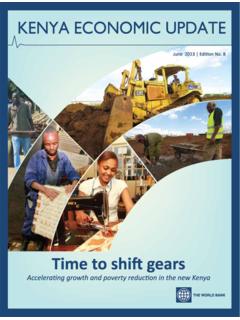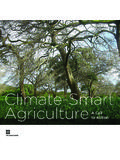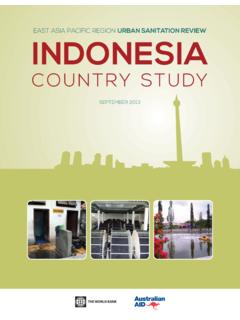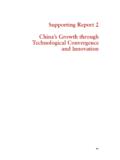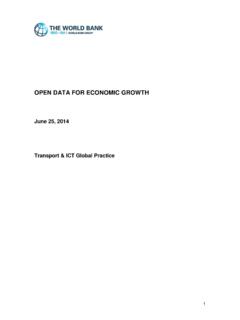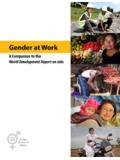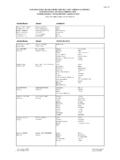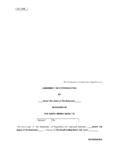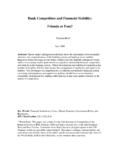Transcription of World Bank Group Turkey Partnership: Country …
1 World bank Group Turkey partnership : Country Program snapshot April 2015 2 RECENT ECONOMIC AND SECTOR DEVELOPMENTS Growth and Economic Management Turkey has many noteworthy achievements that contain lessons for other emerging markets. Turkey s GDP has tripled in nominal dollar terms since 2001, when a deep financial crisis opened the way for a comprehensive macroeconomic and structural reform program. Growth received another boost from the European Union (EU) accession talks starting in 2005 and the favorable external environment prevalent until 2008. Today, Turkey s per capita income of roughly US$10,500 puts it in the Group of upper-middle-income countries.
2 Turkey is a member of the G20 and the Organisation for Economic Co-operation and Development (OECD) and has the 17th-largest economy in the World . Turkey s rising prosperity has been shared. Between 2002 and 2012, the consumption of the bottom 40 percent increased at around the same rate as the national average. Over the same period, extreme poverty fell from 13 to percent, while moderate poverty fell from 44 to 21 percent and access to health, education, and municipal services vastly improved for the less Since the global financial crisis, Turkey has created some million jobs, although increases in the labor force, including through a rise in the participation of women, has kept unemployment at around 10 percent.
3 Turkey s achievements and future potential have been a source of inspiration for other emerging markets, and the World bank has recently completed a report2 describing the Country s experiences in order to share them with interested developing countries (see Turkey Knowledge Program below). Since 2012, however, growth has moderated. In 2013 14, election-related uncertainties, geopolitical developments, and concerns over the Government s handling of corruption allegations dampened confidence and weakened private demand. After growing percent in 2013, the economy slowed to percent in 2014. Moreover, Turkey has been vulnerable to changes in investor 1 Extreme poverty and moderate poverty are respectively defined using the World bank s Europe and Central Asia regional poverty line of US$ and US$5 per day purchasing power parity.
4 Sentiment and, together with other emerging markets, has experienced significant currency and financial market volatility since mid-2013. Moderate growth and a weaker lira narrowed the current account deficit (CAD) to percent of GDP in 2014 from close to 10 percent in 2011. Falling oil prices will help further this year. Figure 1. Inequality among Selected Middle-Income Countries Figure 2. Turkey has experienced strong growth since 2001 Economic activity is expected to remain subdued in the first half of 2015, limiting the full year growth rate to percent. Given the level of uncertainty in the economy, households and corporates are likely to postpone their spending decisions until after the June elections, indicating that any meaningful acceleration in economic activity is unlikely before then.
5 However, private spending is expected to recover markedly following the elections and become the main driver of growth again in the second half of 2015. This rests on the assumption that political uncertainty will be resolved after the elections, and confidence in the economy will be restored. The recovery in 2 World bank , Turkey s Transitions: Integration, Inclusion, Institutions (Washington, DC: World bank , 2014). 3 the second half of 2015 is expected to continue through 2016, bringing the growth rate up to percent. For 2017, growth is projected to slow toward its new potential growth rate. Thanks to lower oil prices, the CAD will fall to percent in 2015 and the external financing requirement will decline to about US$200 billion (US$ billion to cover the CAD, US$166 billion to roll over existing external debt).
6 Inflation is expected to slow to percent in 2015, which is still high but within the band of the Central bank of the Republic of Turkey (CBRT). To realize its underlying growth potential, Turkey needs to accelerate structural reforms and improve trust in its institutions. Turkey s main assets include a young, dynamic population, a large domestic market, and a strategic location, combined with strong infrastructure and much improved public services. However, domestic and foreign investors remain deterred by unpredictability and a lack of transparency in the business climate, and a lack of trust in key institutions. An increase in business investment and innovation as well as in education and skills is needed to boost productivity growth and create enough high-productivity jobs to accommodate Turkey s rapidly growing labor force.
7 The recently unveiled action plans for the 25 priority transformation projects of the 10th National Development Plan provide for an ambitious reform agenda, but the gap between policy announcements and implementation has widened in recent years and needs to be closed to regain investor confidence. Key World bank Group contributions: The World bank maintains a regular policy dialogue on structural policies to boost sustainable and inclusive economic growth, including through multiyear Development Policy Loans (DPLs). The latest series, Sustaining Shared Growth DPL, was approved in July 2014. The World bank is also contributing with economic memoranda on key themes of economic growth such as informality, savings, and trade, an ongoing study on investment, and multiyear assessments focused on public expenditure and financial management.
8 EU Harmonization The EU accession process has been a significant anchor for reforms in Turkey , but progress has slowed in recent years. The EU is Turkey s largest economic partner, accounting for around 40 percent of Turkish trade. Turkey has benefited significantly from deepening integration with the EU through the growing sophistication of both exports and imports and access to financing. Turkey became a candidate for full EU membership at the Helsinki summit in 1999. Accession negotiations began in October 2005, but progress has slowed in recent years in the face of a number of political obstacles (including relations with Cyprus). Both sides are making efforts to regain momentum, with a focus on economic cooperation, in particular the modernization of the Customs Union and energy relations.
9 Out of the 35 chapters of the acquis communautaire, only 13 have been opened since Turkey s negotiations began, and only one chapter science and research has been closed. In 2013, the chapter on regional policy was opened and a roadmap on visa liberalization was signed. However, since then, concerns over deteriorating press freedom, government intervention in the judiciary, and the perception of growing authoritarianism in Turkey have drawn repeated criticism from Brussels, putting the renewed momentum in the accession process at risk. Key World bank Group contributions: The World bank has strongly supported Turkey s EU accession process over the past decade.
10 It is currently supporting Turkey in harmonizing energy and environmental regulations with EU standards and also undertook an independent evaluation of the Customs Union, which was officially launched in April 2014. Financial Sector The Turkish banking sector proved resilient against the effects of the global financial crisis. Turkey s financial sector remains well capitalized and profitable, and Turkey was the only OECD Country in which no explicit or implicit public sector support was provided to the banking sector in the wake of the 2008 09 crisis. Since 2010, the monetary and banking authorities have introduced a wide array of macro prudential tools to manage Turkey s exposure to volatile international capital flows.
